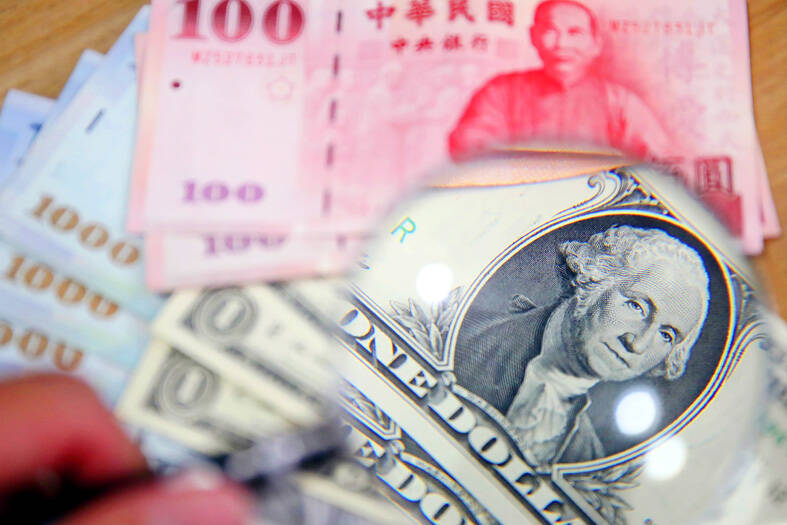Taiwan has been kept on a monitoring list of currency manipulation by the US government in its semi-annual report on the Macroeconomic and Foreign Exchange Policies of Major Trading Partners of the United States.
In the latest report submitted to the US Congress on Tuesday, the US Department of the Treasury said it found that no major US trading partner has manipulated exchange rates to get an unfair competitive edge in international trade during the four quarters through June.
However, Taiwan remained on the watch list for currency manipulation, as did China, Malaysia, Germany and Singapore, while Vietnam was added to the list, the report said.

Photo: CNA
The trading partners analyzed in the report accounted for about 78 percent of US foreign trade in goods and services, the department said.
In the previous semi-annual report released in June, Taiwan, China, South Korea, Germany, Malaysia, Singapore and Switzerland were on the watch list.
The report uses three criteria to determine if a trading partner should be named a currency manipulator. They are: having a trade surplus with the US of at least US$15 billion; having a current account surplus of at least 3 percent of GDP; and persistent intervention in the foreign exchange market, with net purchases of foreign currency of at least 2 percent of GDP.
A trading partner that meets all three criteria can be tagged a currency manipulator, but if it meets only one of the three criteria for two reports in a row, it can be removed from the monitoring list.
Taiwan met the trade surplus and current account surplus criteria, but “foreign exchange intervention was limited in the first half of 2023, consistent with muted currency movements,” the report said.
It advised Taiwan to “deploy a careful mix of policies that better insulate the economy from external shocks and address structural issues to reduce external sector imbalances,” especially in terms of diversifying its energy imports.
It also said Taiwan’s “foreign exchange intervention should be limited and allow currency movements in line with economic fundamentals.”
“Most foreign exchange intervention by US trading partners over the Report period was in the form of selling dollars, actions that served to strengthen their currencies,” US Secretary of the Treasury Janet Yellen said in a statement.
“However, Treasury remains vigilant to countries’ currency practices and the [US President Joe] Biden Administration strongly opposes attempts by the United States’ trading partners to artificially manipulate currency values to gain unfair advantage over American workers,” Yellen said.
The report also called for greater transparency from China, saying its failure to disclose foreign exchange interventions and its lack of transparency on key features of its exchange rate mechanism made it an outlier among major economies and warranted close monitoring.

On Ireland’s blustery western seaboard, researchers are gleefully flying giant kites — not for fun, but in the hope of generating renewable electricity and sparking a “revolution” in wind energy. “We use a kite to capture the wind and a generator at the bottom of it that captures the power,” said Padraic Doherty of Kitepower, the Dutch firm behind the venture. At its test site in operation since September 2023 near the small town of Bangor Erris, the team transports the vast 60-square-meter kite from a hangar across the lunar-like bogland to a generator. The kite is then attached by a

Foxconn Technology Co (鴻準精密), a metal casing supplier owned by Hon Hai Precision Industry Co (鴻海精密), yesterday announced plans to invest US$1 billion in the US over the next decade as part of its business transformation strategy. The Apple Inc supplier said in a statement that its board approved the investment on Thursday, as part of a transformation strategy focused on precision mold development, smart manufacturing, robotics and advanced automation. The strategy would have a strong emphasis on artificial intelligence (AI), the company added. The company said it aims to build a flexible, intelligent production ecosystem to boost competitiveness and sustainability. Foxconn

Leading Taiwanese bicycle brands Giant Manufacturing Co (巨大機械) and Merida Industry Co (美利達工業) on Sunday said that they have adopted measures to mitigate the impact of the tariff policies of US President Donald Trump’s administration. The US announced at the beginning of this month that it would impose a 20 percent tariff on imported goods made in Taiwan, effective on Thursday last week. The tariff would be added to other pre-existing most-favored-nation duties and industry-specific trade remedy levy, which would bring the overall tariff on Taiwan-made bicycles to between 25.5 percent and 31 percent. However, Giant did not seem too perturbed by the

TARIFF CONCERNS: Semiconductor suppliers are tempering expectations for the traditionally strong third quarter, citing US tariff uncertainty and a stronger NT dollar Several Taiwanese semiconductor suppliers are taking a cautious view of the third quarter — typically a peak season for the industry — citing uncertainty over US tariffs and the stronger New Taiwan dollar. Smartphone chip designer MediaTek Inc (聯發科技) said that customers accelerated orders in the first half of the year to avoid potential tariffs threatened by US President Donald Trump’s administration. As a result, it anticipates weaker-than-usual peak-season demand in the third quarter. The US tariff plan, announced on April 2, initially proposed a 32 percent duty on Taiwanese goods. Its implementation was postponed by 90 days to July 9, then